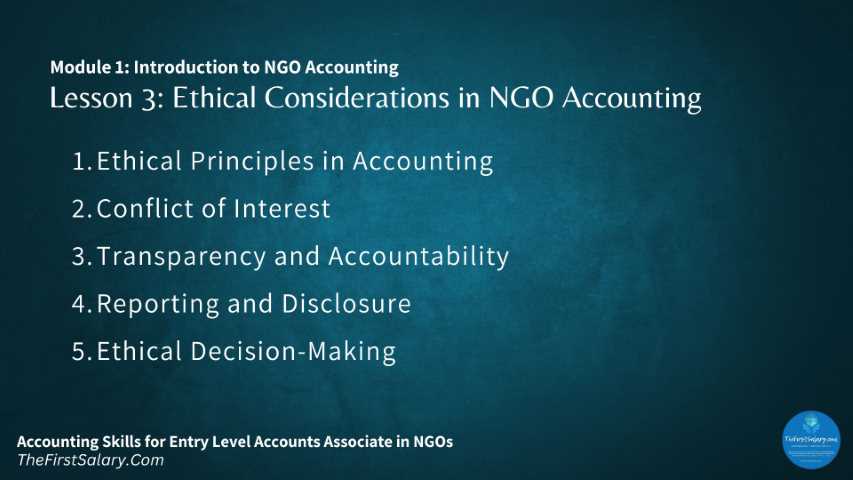
Module 1: Introduction to NGO Accounting
Lesson 3: Ethical Considerations in NGO Accounting
Ethical considerations are crucial in NGO accounting to ensure transparency, accountability, and integrity. This lesson explores key ethical principles, common issues, and best practices for maintaining ethical standards in financial management. By the end of this lesson, you will understand the importance of ethical practices and how to apply them in your role.
Key Concepts:
• Ethical Principles in Accounting
• Conflict of Interest
• Transparency and Accountability
• Reporting and Disclosure
• Ethical Decision-Making
1. Ethical Principles in Accounting:
» Integrity:
Maintaining honesty and integrity in all financial dealings is fundamental. Accurate reporting and honest representation of financial data build trust and ensure the NGO’s credibility.
» Objectivity:
Accountants must remain objective and unbiased when preparing financial statements and reports. Avoiding conflicts of interest and personal biases ensures fair and impartial reporting.
» Professional Competence:
Continuous professional development and maintaining high standards of competence are essential. This includes staying updated with accounting standards and practices.
2. Conflict of Interest:
» Definition:
A conflict of interest occurs when personal interests or relationships affect the ability to act impartially. This can undermine the credibility and effectiveness of financial management.
» Examples:
An accountant with a personal connection to a vendor might make biased decisions that benefit the vendor over the NGO.
» Mitigation:
Disclose any potential conflicts of interest and recuse oneself from related decisions. Implement policies to manage and avoid conflicts.
3. Transparency and Accountability:
» Transparency:
Transparency involves openly sharing financial information with stakeholders. Clear and accessible financial reports help in building trust and demonstrating responsible management.
» Accountability:
Accountability means being answerable for financial decisions and actions. Proper documentation and regular audits ensure that financial practices meet ethical and regulatory standards.
4. Reporting and Disclosure:
» Accurate Reporting:
Providing accurate and complete financial reports is crucial. Reports should reflect the true financial position and performance of the NGO without any misleading information.
» Disclosure of Information:
Disclose relevant financial information to stakeholders, including donors, regulatory bodies, and the public. This includes details about how funds are spent and the financial health of the organization.
5. Ethical Decision-Making:
» Decision-Making Framework:
Use ethical decision-making frameworks to guide actions in challenging situations. Consider the impact on stakeholders, adhere to ethical principles, and seek advice if needed.
» Scenario Analysis:
Evaluate scenarios for potential ethical issues, such as misuse of funds or financial misreporting. Apply ethical principles to resolve these issues effectively.
» Practical Application:
Steps for Ethical Reporting:
1 Ensure accuracy and completeness in financial statements.
2 Disclose all relevant information to stakeholders.
3 Follow ethical guidelines and seek advice when faced with dilemmas.
» Practical Exercise:
Role-play a scenario where you must address a potential conflict of interest. Discuss how to handle the situation ethically and make decisions that uphold the NGO’s integrity.
» Example:
An NGO faced issues with financial misreporting due to undisclosed conflicts of interest. By implementing strict disclosure policies and ethics training, the organization restored trust and improved its financial practices.
Questions:
1 What are the key ethical principles in accounting?
2 How can conflicts of interest be managed in NGO accounting?
» Common Mistakes:
Lack of Transparency: Failing to provide clear financial reports can lead to mistrust and misunderstandings.
Ignoring Conflicts of Interest: Not disclosing or managing conflicts of interest can compromise the integrity of financial decisions.
Inadequate Documentation: Poor documentation of financial transactions can lead to accountability issues and compliance failures.
» Summary:
This lesson emphasized the importance of ethical considerations in NGO accounting, including maintaining integrity, managing conflicts of interest, ensuring transparency, and applying ethical decision-making. Upholding these principles is crucial for maintaining trust and accountability in financial management.
» Takeaways:
• Ethical principles guide honest and unbiased financial practices.
• Transparency and accountability are essential for building trust.
• Proper management of conflicts of interest is crucial.
» FAQs:
What is the importance of integrity in NGO accounting?
Integrity ensures accurate and honest reporting, which builds trust and credibility.
How should conflicts of interest be handled?
Disclose potential conflicts and recuse yourself from related decisions.
Why is transparency important in financial reporting?
Transparency provides stakeholders with clear and accessible information, fostering trust.
What is ethical decision-making?
It involves using ethical principles to guide actions in challenging situations.
How can ethical issues be resolved in accounting?
Apply ethical guidelines, disclose relevant information, and seek advice when needed.
